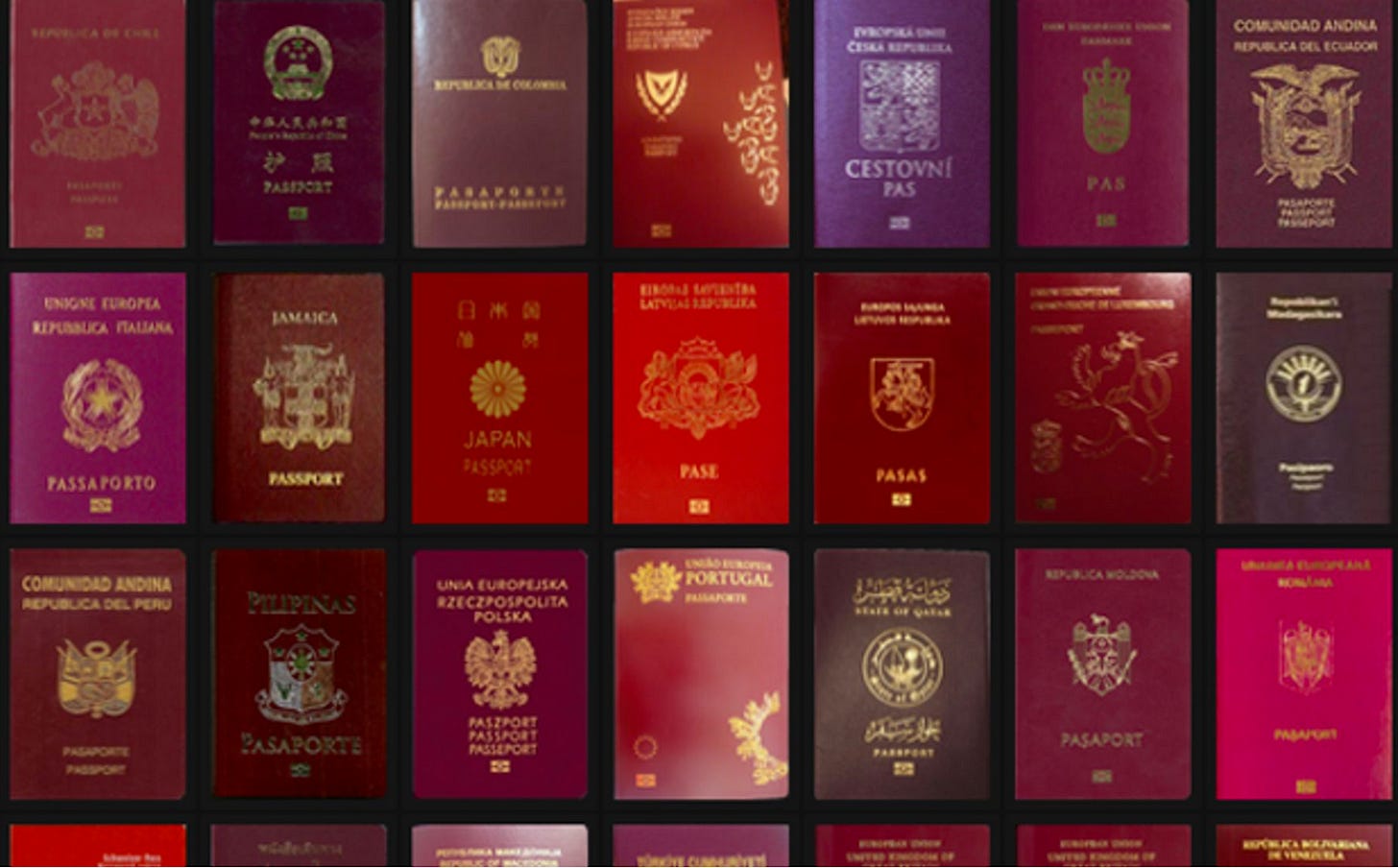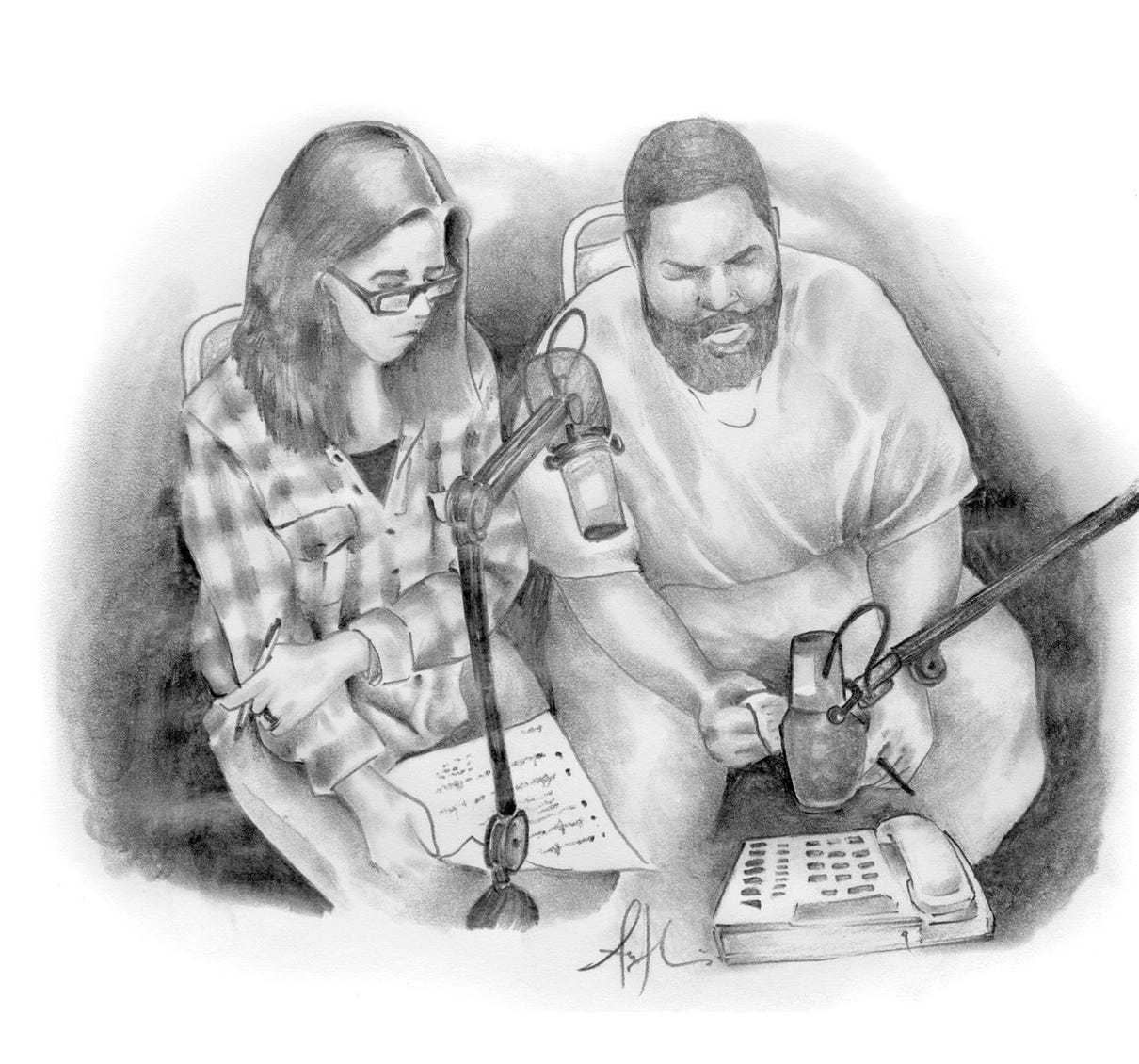Why is this interesting? - The Golden Passport Edition
On mobility, borders, and the idea of citizenship
Colin here. When borders are closed and mobility is limited, it is obvious to think about the passport you have sitting in your desk drawer. Where does that document allow you to go on good days? What, if any, are the political ramifications of the book? If you had another, what would it be?
WITI contributor Atossa Araxia Abrahamian wrote a book called The Cosmopolites, which is an amazing dissection of passports, the citizenship they are tied to, and how people game the system for tax purposes and otherwise. On the surface, it is reporting about the burgeoning global business of buying and selling passports, but the book is also a thoughtful meditation on the haves and have nots. People with a Western passport from Switzerland or Germany never think twice about being able to board a plane on vacation to most locales. Such is not the case for holders of what CNN dubs “the least desirable passports” from Afghanistan, Somalia, Syria, Iraq, or Pakistan.

Abrahamian highlights how the passport is now becoming a marketable commodity to the world’s successful and mobile while remaining painfully out of reach for those who need it most. It is an interesting lens on growing global inequality, told through the lens of airport transfers across places like St. Kitts, Switzerland, Iran, and beyond.
As an Amazon reviewer of the book beautifully stated, “as war and weather produce the largest migrant crisis since WWII, who is allowed to move, unrestricted by national borders, and who must stay? What is the relationship between someone who buys up passports, and the unwilling displaced person who defies borders and nationality out of necessity?”
Why is this interesting?
The Economist recently reported on the phenomenon of the Golden Passport: a passport issued by an EU member country that gives the right to live and work within.
Some EU countries, particularly those with large diasporas, dish out the burgundy like a wine wholesaler at Christmas. Ireland allows anyone with an Irish grandparent to claim Irish citizenship. Given Irish enthusiasm for emigration, this leaves an uncountable number of potential Irish abroad. In Britain alone, an estimated 6m people would qualify for an Irish passport. That is about 20% more than live in Ireland, and thanks to Brexit, many have good cause to apply for one. Italy is even more generous to its diaspora. Anyone with a male Italian ancestor has a shot at an Italian passport. Along the patrilineal line, there is no upper limit, so the right goes back to 1861 and the creation of Italy. (The rights of descendents of women only start in 1948.) Between 1998 and 2010, 1m people obtained an Italian passport in this way. According to one estimate, 60m potential Italian citizens lurk around the globe. (However, many have settled in even richer places, such as America, and are unlikely to return.)
In addition to having wide definitions of what constitutes citizenship and family lineage, there are also countries in the EU that are using it as an investment scheme of sorts. The article continues: “Invest €2.2m ($2.6m) on the island and a Cypriot passport with all the benefits of EU citizenship can be yours. Malta runs a similar (and, at just over €1m, rather cheaper) scheme for anyone tired of traveling with papers that open fewer doors.”
There are unquestionable knock-on effects. One EU country sells a passport and gets direct investment in exchange, and troubles (or troublesome people) stemming from the transaction can quickly cross borders to other member states. The potential problems are many, but in the case of people being able to pony up the cash for an EU passport, money laundering is probably near the top of the list, alongside some shady people not “living the values” that the EU publicly espouses. For these reasons, Ursula von der Leyen, the European Commission’s president, called out the golden passports as one of a list of threats to the rule of law in Europe
But why do countries have different approaches when it comes to citizenship? Atonement is one reason, in the case of Austria, righting the wrongs of history. In the case of Hungary’s Prime Minister Viktor Orban, he has been trying to naturalize ethnic Hungarians who have been scattered across other borders. The reason? Predictably, they help him win elections. It is a clear political strategy.
As questions of borders continue to heat up, with migrant crises, climate change, a global pandemic in addition to the ebbs and flows of laborers following where economic opportunity is happening, this question of passports and nationality, both from the haves and have-nots, will likely loom larger.
Podcast of the day:

Launched in 2017 (and awarded as a Pulitzer finalist in 2020) Ear Hustle is the first podcast created and produced in prison, featuring stories of life inside California’s San Quentin State Prison. According to the site: “Co-founded by Bay Area artist Nigel Poor alongside Earlonne Woods and Antwan Williams — who were incarcerated at the time — the podcast now tells stories from both inside prison and from the outside, post-incarceration.” In 2019, Rahsaan “New York” Thomas joined Ear Hustle as a co-host inside San Quentin. (CJN)
Quick Links:
Social media platforms are destroying evidence of war crimes (CJN)
NYT deep dive on the eBay stalking scandal (CJN)
Love this Guardian feature: Tree of the Week (CJN)
Thanks for reading,
Noah (NRB) & Colin (CJN)
Why is this interesting? is a daily email from Noah Brier & Colin Nagy (and friends!) about interesting things. If you’ve enjoyed this edition, please consider forwarding it to a friend. If you’re reading it for the first time, consider subscribing (it’s free!).


